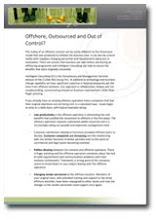
We have been keeping our fingers on the pulse of the legal world surrounding the recruitment industry, so here are the key areas in which legislative changes are taking place…
Zero hours contracts
On 11 March 2015 the government issued the response to its consultation on anti-avoidance measures relating to the exclusivity ban in zero hours contracts. The government plans to prohibit employers from restricting zero hours workers from working for other businesses.
Acas Code and the right to accompaniment to disciplinary and grievance hearings
A new code took effect from 11 March 2015; employers must agree to a worker's request to be accompanied to a disciplinary or grievance meeting by any chosen companion from one of the following statutory categories; a fellow worker, trade union representative or official. It also states that a worker can change their chosen companion without waiving their right to change again. The statutory requirement is based on how reasonable the worker is in making the request, not on their choice of companion.
Data protection
‘Enforced subject access’ will typically occur where a person wishes to see another individual’s criminal record, but chooses not to use the established legal system. The section of the Data Protection Act 1998 (DPA) which made this practice unlawful had become inactive, but came into force on 10 March 2015.
The practice of requesting enforced subject access involves one person (e.g. an employer) requiring another (e.g. an employee) to submit a ‘subject access request’ to specific bodies in order to obtain their personal data and share it with the first person. Employers have previously used this method to get around the Rehabilitation of Offenders Act 1974, which prevents them from requiring the disclosure of ‘spent’ convictions from potential recruits (although they can ask job candidates if they have criminal convictions). Enforced subject access requests are now a criminal offence under the DPA, but employers’ responsibilities under the Vetting and Barring scheme are unaltered by this.
Holiday pay
Following the widely-reported Bear Scotland v Fulton case, non-guaranteed overtime payments must be taken into account when calculating holiday pay. Given the potentially unlimited nature of such claims, the Government has stepped in by introducing a two-year cap on claims for historic holiday pay lodged on or after 1 July 2015.
Maternity leave
On 6 April 2015 the Maternity and Parental Leave etc. (Amendment) Regulations 2014 came into force, extending the existing unpaid parental leave regime to parents of children aged between five and 18. A number of new legislations have come into place, aiming to include couples who are adopting a child from outside the UK in the right to shared parental leave and pay.
Age discrimination
Harrod and others v Chief Constable of West Midlands Police and others – the Employment Tribunal ruled that seven police forces had acted unlawfully in requiring the compulsory retirement of a cohort of officers to meet budget cuts imposed by central government.
Judicial review of fees regime for Employment Tribunal
Unison, the Trade Union, has challenged the introduction of fees for one wishing to bring a claim in the Employment Tribunal, believing that charges would remove access to justice. The initial applications for Judicial review brought by Unison were rejected on the basis that there was insufficient evidence to support their claim. However, recent figures show that the introduction of fees has indeed led to a very significant drop in the number of claims brought in the Employment Tribunal. Unison therefore issued a second judicial review which was again rejected. On 1 April 2015, they received leave to appeal this decision.
Agency workers
Moran and others v Ideal Cleaning Services Ltd - the Employment Appeal Tribunal held that the Agency Workers Regulations 2010 (SI 2010/93) did not apply to a group of agency workers who were assigned to one hirer for periods ranging between 6 and 25 years.
The above is a summary of recent legal issues that may be relevant to UK employers and hirers of workers. It is provided for general information purposes only and specialist advice (such as legal, financial and/or tax advice) should be sought before it is relied on in any way. Neither Resource Solutions Group PLC or its associated group of companies accept liability for any inaccuracies in the above information.







No comments:
Post a Comment